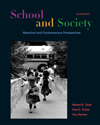 |  School and Society: Historical and Contemporary Perspectives, 4/e Stephen E. Tozer,
The University of Illinois, Chicago
Paul C. Violas
Guy Senese,
Northern Arizona University
Liberty and Literacy: The Jeffersonian Era
Learning ObjectivesAmong the objectives that Chapter 2 seeks to achieve are these:
| Students should deepen and extend their understanding of the key terms of inquiry, particularly the triad of political economy, ideology, and schooling, by seeing them applied in a particular historical context. In particular, they should be able to talk and write about the relationships among various dimensions of political economy, ideology, and the nature of schooling in the early republic, as identified in the analytic framework on page 42. |
 |  |  | | Students should begin to critically evaluate the strengths and weaknesses of classical liberalism, noting its potential for realization of democratic ideals but noting its limitations in terms of population groups excluded because of race, gender, and economic class. |
 |  |  | | Students should be able to understand Jefferson's rationale for his educational proposals as it relates to the political economy and ideology of that time. |
 |  |  | | Students should begin to entertain and evaluate alternative views of democracy: that it can be construed as a system of representative government, but also as an ideal of human interaction in which all individuals are expected to share in making the decisions that affect their lives. They should also begin thinking about the implications that each view of democracy might have for educational practices. |
 |  |  | | Students should be thinking about whether there might be a potential for conflict between ideals of meritocracy and ideals of democracy, particularly if the definition of "merit" is derived from a segment of the population that is not representative of the entire population. |
 |  |  | | Students should engage in thinking critically and appreciatively about Jefferson's proposals for who should fund and control public schooling in Virginia, comparing those ideas with their knowledge of how schooling is funded and controlled today. |
|



 2002 McGraw-Hill Higher Education
2002 McGraw-Hill Higher Education